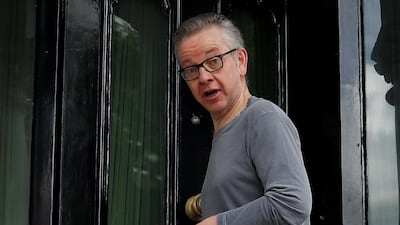Politicians from Britain’s ruling Conservative Party jockeying to replace prime minister Theresa May have been outlining their leadership bids, with one candidate promising to give free passports to EU nationals after Brexit.
Environment Minister Michael Gove, who unsuccessfully ran for the party leadership in 2016, has said he will waive a naturalisation fee of £1,330 (Dh6,188) for an estimated three million eligible EU citizens.
“Michael Gove is ready to unite the country. Guaranteeing the rights of EU nationals here in the UK through a declaratory scheme, and making a generous offer of citizenship to those lawfully here at the time of the referendum, is a first step in that direction,” a source close to Mr Gove said on Monday evening.
Mr Gove, a leading Brexiteer, believes the move is “the right thing to do”, the source added.
The guaranteeing of EU citizens rights, maintaining an open border in Ireland and settling Britain’s debts to the EU are the three main components of the divorce deal with Brussels.
The EU has insisted that unless all three are settled, the bloc will refuse to discuss a future relationship with London, running the risk that the UK will crash out without a withdrawal agreement in place.
Mr Gove’s cabinet colleague Jeremy Hunt, who is also one of the contenders to replace Mrs May, warned on Tuesday that any prime minister who tries to push through a no-deal Brexit would be committing “political suicide”.
Writing in the Daily Telegraph, Foreign Secretary Mr Hunt said if the Conservatives attempted to pursue no-deal they would face parliamentary revolt, which would end in a no-confidence vote and a general election.
“I have always believed that no deal is better than no Brexit, but parliament has passed laws to stop a government willingly walking into no deal,” he said.
Leadership rival and hardline Brexiter Esther McVey said it would be “political suicide” for the Conservatives if the party did not leave the EU on the extended departure date of October 31.
The Conservatives are dusting themselves down after a dismal performance in the recent EU Parliament elections, in which they lost seats to the newly formed Brexit Party.
Meanwhile, the main opposition Labour have come under pressure to formally back a second referendum after they lost support to the Liberal Democrats, the Green Party and smaller pro-Remain parties.
Labour’s current policy is to back a second referendum as a last resort if it is unable to find a Brexit compromise deal with the government or win a general election.
Despite signals that its Brexit policy might be altered after senior MPs including shadow foreign secretary Emily Thornberry said it was now time for Labour to back the People’s Vote campaign, shadow home secretary Diane Abbott said on Tuesday that the party would still back a general election as its first option.
“There is no inherent contradiction between respecting the referendum and having a People’s Vote,” Ms Abbott told the BBC.
“It’s still not sure how a People’s Vote would pan out. I’ve always argued that it’s perfectly possible that Leave would win again.”
While the pro-Leave Brexit party won the most seats in the EU Parliament elections in the UK, collectively outwardly Remain parties backing a second referendum won the biggest share of the vote, 39.1 per cent.


